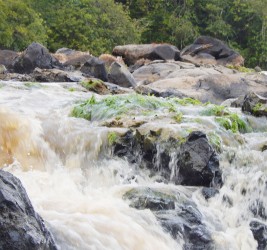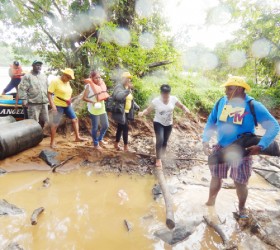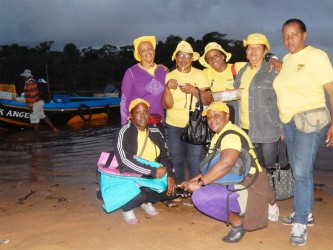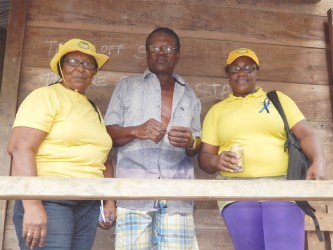Following a three-day ‘awareness’ trip to the Cuyuni area, Region 7, the Guyana Women Miners Organisation (GWMO) said it remains concerned about the conditions under which women in the interior are forced to work and about the number of young girls who are still being trafficked.
President Simona Broomes and nine other members of the organisation rescued five teenagers ‒ four 17-year-olds and a 16-year-old ‒ from different locations during that trip, and the girls have since been handed over to the relevant authorities. One of the girls was rescued from the Mahdia area last year.
Broomes, in a recent interview with the Sunday Stabroek, said the teenager who is being re-trafficked had traumatic experiences in her earlier life, and was first introduced to prostitution in the mining sector at the tender age of 14. After she was rescued and placed in a shelter for a while she was denied the right assistance and returned to the interior. Her sister had signed for her to be released from the shelter but the child told Broomes that after she was found in Cuyuni she heard nothing back from the officials and since she needed money she decided to make it the best way she knew. Two of the victims got pregnant at young ages, and one was “fooled” by a woman who took her into Port Kaituma, “put her to prostitute and from then she think that is the only thing she can do.” Another was living with a woman, who Broomes said is known prostitute in the Arangai area, and who told her that she was getting a job for her, that turned out to be prostitution.

According to Broomes many of the shop owners in the area are aware of the trafficking law but argued that while the girls are under the age of 18 they have a child or they are not virgins and as such, no law is being broken.
“It is really sad to see what value we place on the lives of our young people,” Broomes said.
And Broomes noted that there is still no system in place to immediately help victims when they are rescued. She gave the example of the Bartica Police Station where there is no mechanism for assistance in place, and which should at least be able to feed victims.
“It is not the fault of the officers, but it [a mechanism] is just not in place, so we still have to fetch that burden after two years, to pay their passage, to bring them down and even when they arrive in Georgetown we still had to buy bath towel and all these things to take to the shelter.”
The organisation president recalled that they had recommended to the Minister of Human Services & Social Security that a care package to be readily available for victims of human trafficking, but this is still to become a reality. She noted that it is not a case of the organisation not wanting to work with the relevant authorities; as a part of civil society they will continue to advocate for the rights of the most vulnerable, and in this instance it is the trafficking victims.
Most of the victims are crying out for a better life and their cries should be heard, Broomes said, pointing out that they would all have gone through some horrific experiences.

The GWMO president said while they support legitimate business in the interior and are not against people making money, the organisation would not sit idly by and allow young girls to be trafficked and older women exploited.
Broomes again mentioned the woman who brings nationals from Venezuela and Dominica to work as prostitutes in the interior, and at least five of the foreigners she saw during her trip did not have work permits. She said the woman has been engaging in this practice for quite some time and believes the authorities should looker more closely at the situation.
“It is known to all the authorities that pass through the area that this woman brings these foreign nationals and nothing is being done, and it is just frightening that it is something that people can get away with so easily and make lots of money,” she said.
After twenty-something years…
Meanwhile, the GWMO president said it is very disconcerting to see what women are still experiencing in order to earn a living in the industry and yet they are still being denied a level playing field and are still not being recognized by the authorities.
“While we were there we were just observing the mere conditions under which these women have to work, the places that they would have to take a bath, the washrooms and all those things. It is just the same as twenty-something years ago, much has not changed,” Broomes said, adding that it is something the organisation views as a major concern and will continue to work on it.
The organisation is still trying to get women who go into the interior to have food handlers’ licences and for them be proud of their job, which will translate into them improving their appearance in the interior. She said once a woman who is a cook in the interior joins the organisation she usually talks to them about how they should groom themselves at the location.

The health of women and men is still vulnerable, Broomes said, as she noted that many times there is no access to health facilities. These were some of the complaints they received during their journey with many workers reporting that the areas are never visited by persons in authority. Broomes pointed out that millions of dollars are derived from the mining industry but its standards do not reflect that wealth.
She said the social aspect of the communities also needed to be improved and as she had advocated before, shops should not be built in an ad hoc manner, but should be planned and laid out properly, and they should have access to water, among other essentials. She said this would lift the standard of life for persons in the area.
One positive element of the trip, according to Broomes, was the manner in which they were embraced by men who encouraged the organisation to continue its work. It was suggested that the industry could be transformed in such a way that the spouses of men can visit from time to time. This situation, according to some men, could lead to a reduction in the prevalence of trafficking in persons as the demand for prostitutes would not be as huge as it is today.
Broomes also commended the police for working along with them on the trip, noting that they were very supportive. She said it is hoped that they would be meeting with the Commissioner of Police in an effort to strengthen the working relationship between the force and the GWMO.

And the GWMO president spoke about of how challenging the trip was because of the dangerous rapids, and while they had initially hoped to travel by plane that was not possible. While danger was always lurking, Broomes said that at no time were the lives of the team members or the five women rescued at risk.
“Because I know the area I would forewarn the captain that at certain points I would want the members to be offloaded and walk around…” Broomes said.
The GWMO president was in high praise of the British High Commission which made the trip possible with a grant of a little over $3.2M, and she adverted to the fact that it was the first project in the two years the organisation has been in existence that was funded. They visited about 100 shops during the awareness campaign, and persons were educated about the trafficking law and other social issues; posters were also put up at strategic points.





